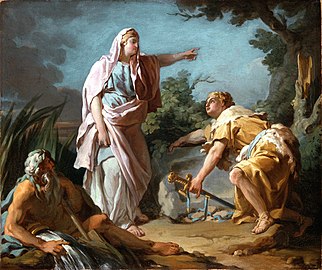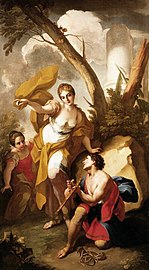
Aethra (mother of Theseus)
In Greek mythology, Aethra or Aithra (English: /ˈiːθrə/;[1] Ancient Greek: Αἴθρα, pronounced [ǎi̯tʰra], the "bright sky")[2] was a Troezenian princess and the daughter of King Pittheus.
For other uses, see Aethra (Greek mythology).Mythology[edit]
Early life[edit]
Bellerophon came to Troezen to ask Aethra's father, Pittheus, for the maiden's hand in marriage, but the hero was banished from Corinth before the nuptials took place.[6]
In popular culture[edit]
With significant alterations to the character, a version of this Aethra appears (as "Aithra"), a sorceress and concubine of Poseidon, in Richard Strauss's famous opera Die ägyptische Helena (The Egyptian Helen).


